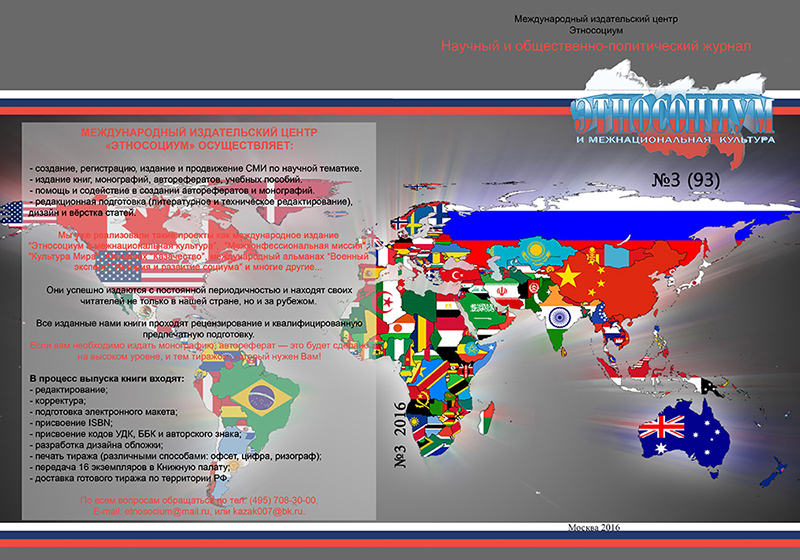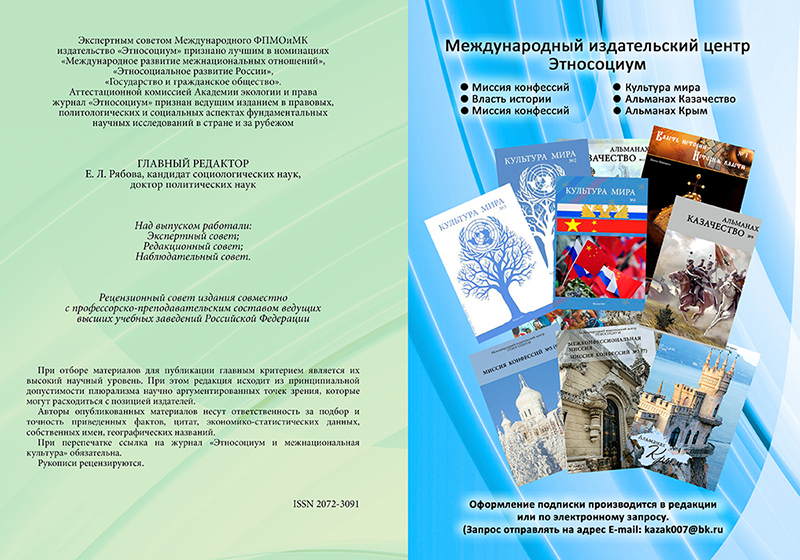

Content
|
COUNCIL OF INTERNATIONAL RELATIONSHIP
|
|
|
Ezhova M.Y. Civic Identity: Conceptual and Theoretical Origins
|
9
|
|
Cogoeva F.B., Dzutsev H.V. Public Opinion of the Activities of Power Institutions of Russia’s Republics of North Caucasian Federal District
|
13
|
|
POLITICS, ECONOMICS, LAW:
ACTUAL PROBLEMS OF MODERN SOCIETY
|
|
|
Ternovaya L.O. Symbolism of the Student Movement
|
30
|
|
Efimov D.A. Financial and Legal Status of Microfinancing Organizations
|
37
|
|
Mikhaylina T.I. Reflection of the Link between Language and Politics in the Term “Energy Security”
|
47
|
|
Efimov D.A. Financial and Legal Status of Microfinancing Organizations
|
51
|
|
Tkachenko E.N. Development of Charity Activity Abroad
|
59
|
|
POLITICS, ECONOMICS, LAW:
REGIONAL STUDY
|
|
|
Burganova I.N. Migration to the European Union: the duality of politics and culture
|
65
|
|
INTERNATIONAL RELATIONSHIPS:
POLITICS, ECONOMICS, LAW
|
|
|
Gasimov S.K. Concerning the History of Formation of the National İnterest Concept
|
71
|
|
Ivanova T.S. Political Problems of Argentina: in Search of the Balance of Interests in the Changing World (a case study of Latin American mass media)
|
77
|
|
People's Republic of China
|
|
|
Kazanin M.V. Military and Political Security of the PRC: Threats and Possible Ways of Implementation
|
82
|
|
He Zhiyun The Art of Architecture and Costumes: Some of the Features of European and Chinese Culture
|
88
|
|
CONFERENCE:
Economics and Law
Etnoekonomika in the sustainable development of regions of Russia: the legal basis
Legal regulation of public-private partnerships in a global economy
Russia: state and society in the new reality
|
|
|
Makeeva V.V. Governing Practice in Education in the XIX Century: Experience of North Caucasus
|
94
|
|
Pimenova E.A. Interregional Connections in the South of Russia: Astrakhan’s Experience in the 16-19th Centuries
|
102
|
|
REVIEW
|
|
|
Ilarionova T. S. Book Review. "France and Germany in a united Europe" S.V. Baranov, E.L. Ryabova
|
108
|
|
Annotations
|
110
|
|
Authors
|
115
|
|
Requirements to materials submitted to the international publishing house "Etnosocium"
|
117
|
The article describes the conditions of formation of civic identity, the necessity of civic identity as a condition for overcoming differentiation in the society, which is based upon ideological and value differences. The concept of civic identity in the system of social worldviews is analyzed.
Keywords: identity, citizenship, communication systems.
The article discusses the main issues related to the activities of the authorities of republics of the North Caucasus Federal District of the Russian Federation on the basis of ethno-sociological research materials held in the summer of 2015.
Keywords: power, the executive and legislative power, social issues, law, reconstruction, civil institutions, national origin, agricultural areas, private property and migration.
The student movement is one of the oldest social movements. Over the centuries of its existence, it has developed a system of symbols to facilitate the identification of students and the formation of corporate spirit. However, in recent decades, this symbolism is increasingly giving way to the symbols of political protest, reflecting the mood among high school youth.
Keywords: characters, the student movement, political protest, the right to education.
In the article, the author speaks on the history of development of microfinancing organizations, the problem of understanding their place and significance in the market of financial services, and also the development of this market segment in Russia.
Keywords: microfinancing organizations, microfinancing, micro-crediting, micro-loan, microfinance activity.
In the article, the author dwells upon some aspects of development of charity activity in several foreign countries. A special attention is drawn to the experience of historical development and transformation of forms and methods of organization, regulation and realization of charity activity in Great Britain, the United States of America and other countries.
Keywords: charity, regulation, financing, support.
The article focuses on the origin of the term “energy security” in the Russian language and its comparison with its English prototype. “Energy security” has entered Russian political discourse as a loan translation. Its original meaning is quite concrete and relates in the first place to having enough energy resources, stable and secure energy supplies. This meaning also ensues from the analysis of the definitions of the word “security”. That is why it is more appropriate to translate energy security into Russian as availability of / sufficient energy supplies.
Keywords: energy security, political discourse, harmonization of thesauruses, political vocabulary, concept, loan translation.
In the article, the author dwells upon the history of development and the perspectives of the pension system of Russia. The author defines the role and place of the non-state pension funds in the pension system of Russia. There is an overview of international experience in establishing and developing non-state pension funds, the question of their state regulation and control of the activity of the funds. Besides, the author raises the question of arbitrary practice in the sphere of law enforcement.
Keywords: non-state pension funds, non-credit financial organizations, systems of pension provision, pension reform, retirement age, retirement pension, PAYG component, investment part of the state pension, state control of the non-state pension fund activity, Bank of Russia, law enforcement, developmental strategy of the financial market, treaty-made law.
The article presents the results of study of the political and cultural aspects of the migratory stream to the member states of the European Union at present. The problem is analyzed at different levels: everyday relations between EU citizens and migrants; political dialogue of the member states of the European Union in connection with the problem; identity/misunderstanding between the population and authorities concerning the influx of refugees before the response of other national actors (states) to the actions of the EU in relation to the influx of migrants. The attention is paid to the problems associated with the increase in cultural conflicts due to the influx of illegal immigrants in the EU. It is shown that today in Europe the problem of intercultural and inter-religious conflicts reaches the new level addressing such problems as the threats to the safety of EU citizens, the attacks on European values and the homogenization of the cultural identity of Europeans. It is concluded that the internalization of liberal values among refugees is impossible if migrants are not ready to get involved into the European environment voluntarily. The political differences between the member states of the European Union concerning the effective steps in solving the problem of influx of migrants especially considering the adoption of the Dublin Convention are demonstrated. The variants of migration policy introduced by the supporters and opponents of migration into the EU (German and British solutions of the problem) are assessed.
Keywords: migration to the member states of the European Union, European Union, migration, illegal migration, multiculturalism, international relations, integration of the European Union.
In spite of the inclusion of the concept of national interest into the Oxford Encyclopedia of Social and Political Sciences about 85 years ago, this term and expressions related to this term are as ancient as the human society itself. This is the idea the article is based on.
A national interest is described in terms of formation as an individual and a social need, with its necessity in the mythological and religious sense. The formation of the nation has also reached to the national interest level. Here the author analyzes the history of development of the national interest concept. American and European politicians’ roles are mentioned.
It is of a special interest for us that after the Soviet Union’s collapsing, many researches on this problem have been done in post-Soviet areas. Nowadays, the geopolitical category of the national interest becomes a very widespread concept.
Keywords: needs, national interests, politics, political science, geopolitics.
In the article, we analyze some problems of establishment of a political course of the new Argentinean government. The author dwells upon the question of the Falkland Islands in the context of relationships of Argentina with the United States and Great Britain. The study conducted gives an overview and a possible perspective of Russia-Argentina relationships in the new political reality.
Keywords: Russia-Argentina relationships, Mauricio Macri, Peronism, Cristina Kirchner, the Falkland Islands, las Islas Malvinas.
The article deals with some threats to military and political security of the PRC, characteristics of the methods of intelligence activities, special services and the armed forces of the United States, Japan and Taiwan against China. The authorities of China are making adequate efforts to combat the activities of foreign secret services on their territory, the activity of which, without a doubt, presents a threat to national security.
Keywords: national security, intelligence activities, special services, Internet, electronic intelligence.
Fashion design and architecture are arts based on visual perception, their mutual influence on each other began a long time ago. A particular attention should be paid to the process of interpenetration and mutual enrichment of European and Chinese approaches in the field of architecture and art of costume.
Keywords: fine art, costume, architecture.
On the basis of historical, legal and political source analysis, the author of the article dwells upon the question of management and governing practices in the field of education during the XIX century on the territory of North Caucasus.
Keywords: Russian empire, the peoples of North Caucasus, management, education.
On the basis of analysis of the political, historical and cultural resources, we dwell upon the importance of Astrakhan and its role in the inter-regional relations in the period from the XVI to the XIX century.
Keywords: interregional relations, cooperation, the Caspian region, foreign policy, resources, trade.